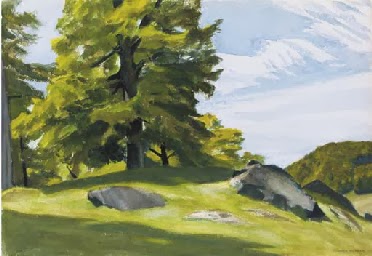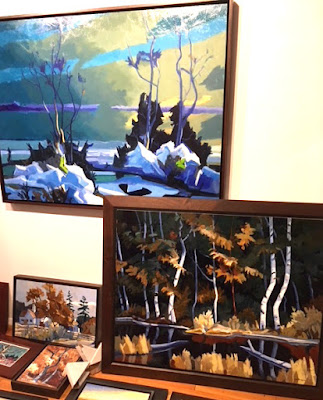Charles Burchfield's Dream About Edward Hopper
Edward Hopper, Sugar Maple, watercolor, 1936
Two artists I look at a lot are Charles Burchfield and Edward Hopper. Their work intrigues and delights my eyes. But just as important studying their art has made me a far stronger painter.
Unlike taciturn Hopper, Burchfield prodigiously kept journals throughout his life. His writing is often poetic and sometimes shows surprising candor.
Burchfield recorded a dream he had about Hopper in his journal from July 28, 1947. (The two were friends, showing for years together at New York's Frank Rehn Galleries. Despite the major differences in their painting styles, each deeply respected the other's work).
Here's what Burchfield wrote-
Dream:
Of being in a wood, and coming upon a picture by Hopper which he had just completed (It seemed as if he he was "summering"in the woods and had rented a small portion of it, to which he confined himself- There were several large oaks surrounding a small clearing). The picture I thought was superbly done, and made all that I had been doing lately seem weak by comparison. The scene he depicted was a narrow forest glade at late afternoon with the almost level rays of the sun filtering through, to illumine leafy branches here & there. Awake, I no longer can recall the details that made this such a remarkable picture, but I now realize it was not a typical Hopper picture, but a subject I might be more likely to do.
I had to smile at Burchfield's uncertainty about the quality of his own work. Self doubt is the price of admission for any artist who aims high. It keeps one from too quickly accepting whatever happens in one's painting as being the best one can do. Self criticism like this can lead to producing terrific art, as so many of Burchfield's remarkable watercolors attest. But on a feeling level, this trait is unnerving. With this dream Burchfield is paying his dues.

Charles Burchfield, Dawn in the Early Spring, watercolor, 1946-66
Why does Burchfield envision this "superbly done" painting as being done by someone else? I think it's an admission of how inaccessible one's talent and insight sometimes can be for a painter. Despite their being friends, Hopper was personally and artistically a very different person than Burchfield. To Burchfield Hopper was something of the "other" and always remained a bit unknowable.
Through his dream Burchfield is in a way confessing he doesn't fully understand his own talent. Can't you sense Burchfield's frustration waking from this dream and realizing his imagined Hopper was doing a superior job on one of Burchfield's signature subjects.
Despite that, Burchfield soldiered on through both his periods of confusion and of inspired productivity. His talents included knowing how to replentish himself, sustain his enthusiasm, and persevere. We are lucky he knew himself so well.



